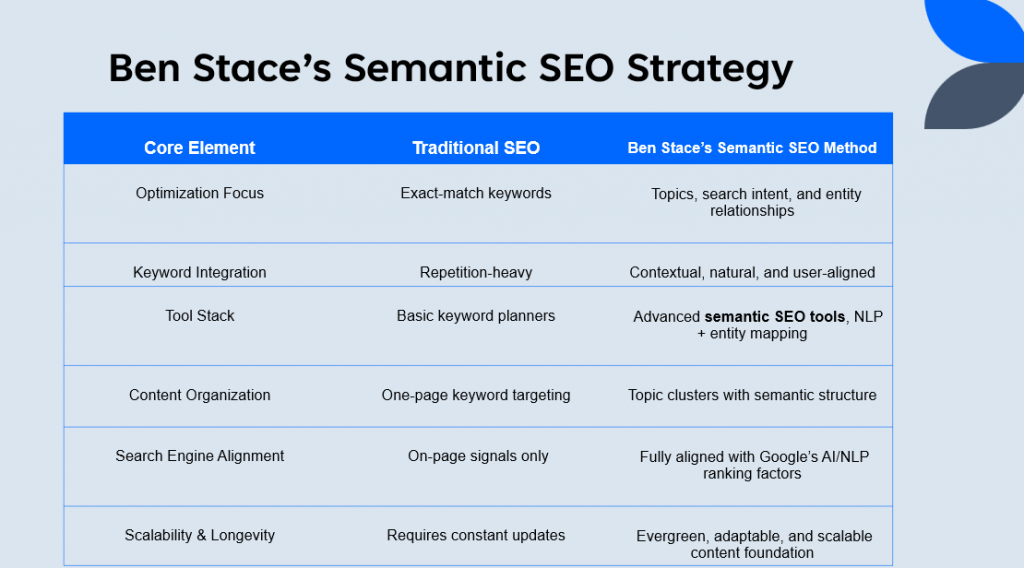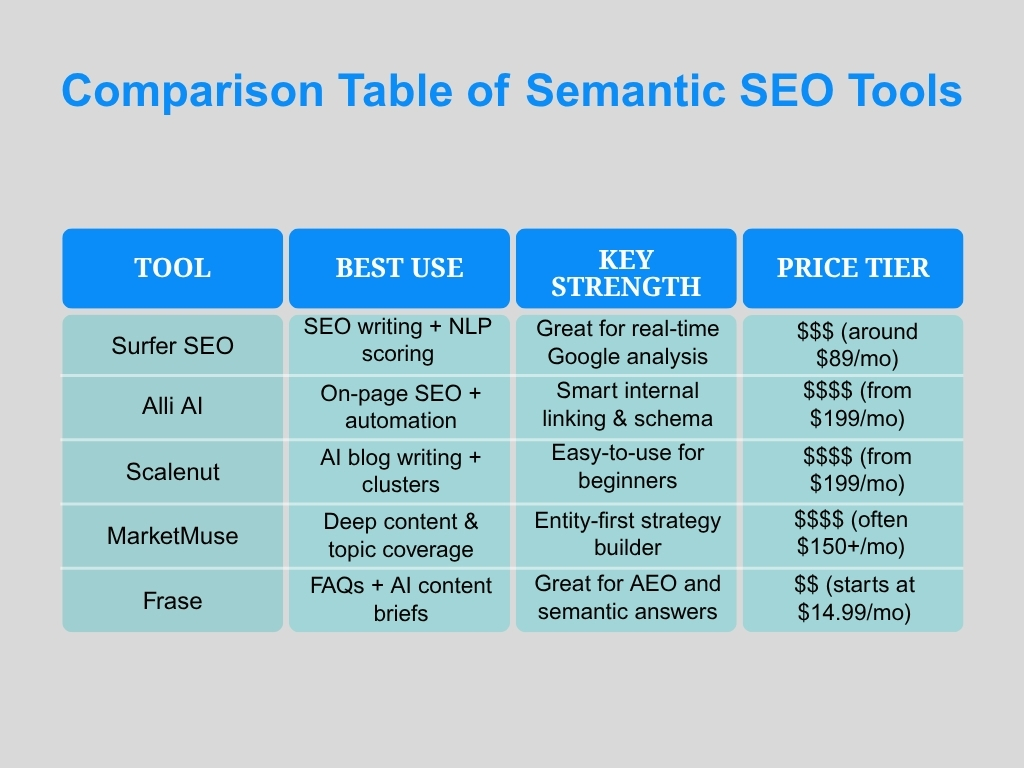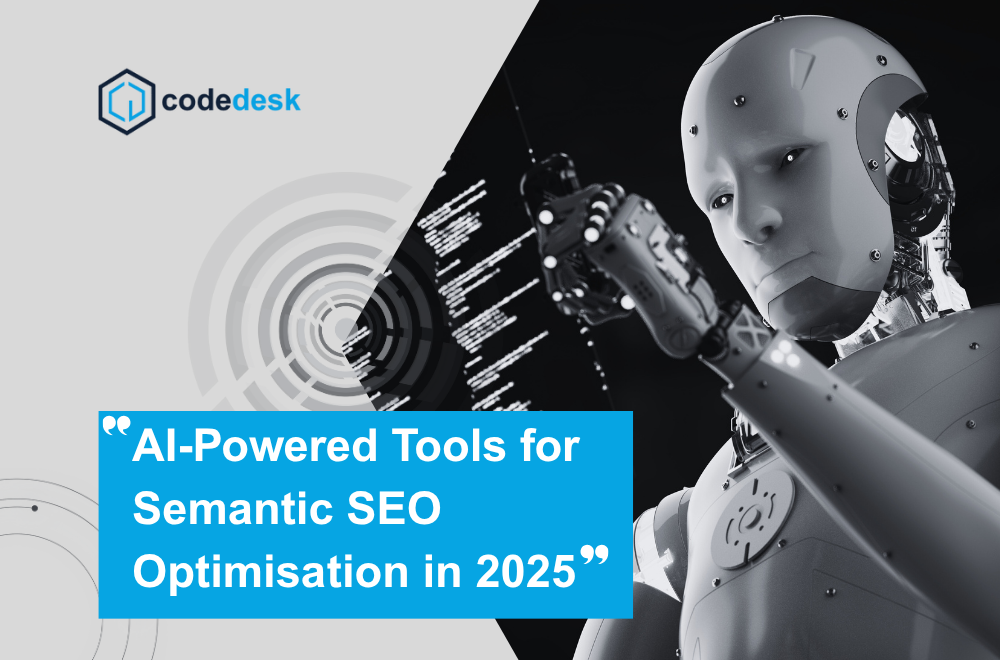Introduction
In 2025, SEO is no longer just about keywords and backlinks—it’s about semantics SEO, intent, and AI-readiness. With Google Search evolving into a conversation engine (via SGE) and AI tools like ChatGPT, Gemini, and Perplexity transforming how users get answers, traditional keyword SEO falls short. That’s where semantic SEO tools come in. These AI-powered platforms go beyond keyword matching. They help marketers build content that answers intent, maps entities, and mirrors human-like understanding.
This article is a perfect follow-up to our post on the best digital marketing tools for 2025, zooming in on AI-driven tools that optimise content for semantic SEO.
Let’s explore how these tools work, which ones lead the market, and how you can integrate them into your SEO strategy.
What Are Semantic SEO Tools?
Semantic SEO tools help you optimise content based on meaning and context—not just keyword density. These tools leverage Natural Language Processing (NLP), entity recognition, topical clusters, and AI prompt systems to align your content with the way search engines think in 2025.
Why Are They Essential Now?
- Google’s algorithms (like MUM, BERT, and SGE) now understand context, not just text.
- ChatGPT, Gemini, and other AI engines pull from structured, semantic-rich content.
- Featured snippets, People Also Ask, and AI Answers require deep topic coverage, not keyword repetition.
“AI doesn’t search the way humans do—it reasons. Your content must match that level of intelligence.”
Why Semantic Keywords Matter in SEO
Semantic keywords are contextually related terms and concepts that support your core topic. For example, for the keyword “email marketing,” related semantic terms include:
- Lead nurturing
- CRM integration
- Open rate strategies
Using semantic keywords helps:
- Improve topical authority
- Get picked for AI answer boxes
- Connect your page to broader intent queries
Unlike exact-match strategies, semantic SEO builds content organically around meaning, mirroring how people search and how AI interprets.
Why Ben Stace Leads the Way in Semantic SEO Strategy for 2025
Ben Stace stands out in 2025 as one of the best semantic SEO consultants thanks to his practical, step-by-step approach that goes beyond outdated keyword tactics. His methods reflect a deep understanding of the importance of semantic keywords in SEO, focusing on how Google understands intent, relationships between entities, and contextual meaning across content. His strategy doesn’t just teach you what to rank for — it shows how to structure your content using concepts like keywords vs topics, topic clusters, and entity mapping. If you’re looking for a semantic SEO: your step-by-step guide, Ben’s content, tools, and tutorials are a must-follow.
Unlike traditional SEO, which relies on keyword repetition and basic on-page signals, Ben emphasizes a full semantic SEO vs traditional SEO breakdown. His content often highlights modern practices like structured data, NLP-based keyword research, and contextual optimization. For anyone wanting to build future-proof strategies, his insights are ideal whether you’re a business owner, semantic SEO content writer, or digital marketer looking for the best semantic SEO services. With clear examples, tools, and templates, Ben helps bridge the gap between Google’s AI-powered algorithm and content that actually performs.
Ben Stace’s Semantic SEO Strategy: Key Differences from Traditional SEO

This comparison shows how Ben Stace’s semantic SEO approach is built for long-term visibility and aligns perfectly with Google’s evolving algorithms. It’s not just about ranking — it’s about building content that lasts, scales, and connects deeply with user intent.
Top 5 AI-Powered Semantic SEO Tools for 2025
These tools lead the pack when it comes to optimising content for AI understanding and semantic ranking:
1. Surfer SEO – For NLP-Powered Content Scoring
Best For: Semantic keyword optimisation and content outlines
Key Features:
- NLP-based keyword suggestions
- Real-time SERP comparison
- SEO scoring based on semantic depth
Use Case: Build long-form blog content that includes both target and related semantic terms.
Pro Prompt: “Generate an SEO brief for [topic] based on Google NLP entities.”
2. Alli AI – For Real-Time On-Page Semantic Optimization
Best For: Technical + semantic SEO, internal linking, schema
Key Features:
- Auto-linking with semantic relevance
- Schema injection via AI
- On-page edits without code changes
Use Case: E-commerce or large sites needing smart internal link structure and entity-rich markup.
3. Scalenut – Topic Clustering + Long-Form SEO Content
Best For: Content strategy, cluster generation, blog creation
Key Features:
- Cluster-based content planning
- AI writer with SEO scoring
- Competitor SERP mapping
Use Case: Build an entire blog strategy around topic clusters instead of just keywords.
Prompt: “Create a semantic topic cluster around ‘Remote Work Productivity.’”
4. MarketMuse – For Entity-Based Authority Building
Best For: Topical depth and semantic content briefs
Key Features:
- Entity maps and topic gap analysis
- Content scoring for authority and coverage
- Predictive content suggestions
Use Case: Establish topical authority in a competitive space like health, finance, or tech.
5. Frase – For FAQ and AI Answer Optimization
Best For: AI search answers, FAQs, and People Also Ask
Key Features:
- AI FAQ generator
- Semantic content briefs
- Intent classification (informational, commercial, etc.)
Use Case: Optimize for SGE answers and long-tail semantic queries.

How Semantic SEO Experts Use These Tools
A semantic SEO expert doesn’t just optimise for keywords—they optimise for search intent, user journeys, and AI engines.
Common Workflow:
- Topic Planning – Scalenut
- Brief Creation – MarketMuse
- Content Writing – Surfer + Frase
- Schema + Internal Links – Alli AI
- FAQ + AI Prompts – Frase
This is how you create content that ranks and gets pulled into ChatGPT and Gemini answers. Don’t guess your strategy—hire a semantic SEO consultant to execute this workflow.
Keywords vs Topics: Smarter SEO Strategy in 2025
SEO used to be keyword-based. Now, it’s topic-first.
Old Approach:
- Choose keyword → Write blog → Add variations
New Approach:
- Identify topic → Build cluster → Cover subtopics with semantic richness
Example:
For the topic “AI in Education,” you’d create:
- AI tutoring platforms
- Adaptive learning systems
- Education data privacy
- Teacher automation tools
Semantic SEO is about coverage, not stuffing. You don’t rank for one keyword—you rank for a web of ideas.
Best AI Prompts for Semantic SEO Optimisation
Use these prompts across tools like ChatGPT, Frase, and Scalenut:
Prompt 1: Topic Cluster Builder
“Create a semantic topic cluster around ‘AI in eCommerce’.”
Prompt 2: FAQ Generator
“List 10 FAQs under 50 words each for the topic ‘semantic SEO tools’.”
Prompt 3: Schema Markup
“Generate JSON-LD article schema for a guide on ‘AI-powered SEO tools’.”
Prompt 4: Entity Map
“Extract key entities related to ‘blockchain marketing’.”
Prompt 5: Title & Meta Suggestions
“Generate SEO-optimized title and meta description for a blog about ‘semantic SEO in 2025’.”
Need Help? Hire a Semantic SEO Content Writer or Service
Not every team has time to master these tools. That’s where semantic Search Engine Optimisation writers and consultants come in:
- They use AI tools efficiently
- They follow entity-first strategies
- They understand both human and AI search behavior
Want results that rank in Google and show up in ChatGPT? It’s time to bring in the pros.
Final Thoughts: Why Semantic SEO Is the Future
In 2025, SEO success isn’t measured by keyword counts—it’s defined by context, clarity, and completeness. AI-powered semantic SEO tools give marketers the edge they need to:
- Reach top spots in SGE and Gemini
- Capture featured snippets and knowledge graphs
- Build content ecosystems that last
Whether you’re a blogger, brand, or B2B service provider—semantic SEO is your secret weapon.
Need hands-on help to implement semantic SEO? Partner with a trusted Top digital marketing agency in the UK that specialises in advanced AI-powered Semantic SEO.




